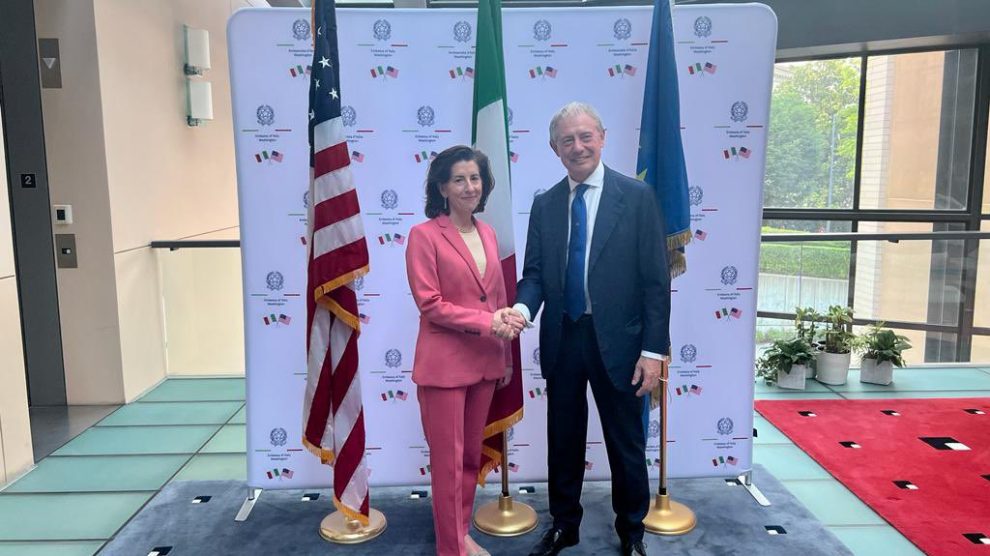Adolfo Urso is back from Washington. The Italian Enterprise Minister just returned from a four-day trip to the United States, where he met with members of the Biden administration – most notably, Secretary of Commerce Gina Raimondo –, heads of investment funds and managers against the backdrop of celebrations for Italy’s Republic Day in the US capital.
- Next up are the Foreign and Defence Ministers, Antonio Tajani and Guido Crosetto, who will fly to the US shortly – and likely finalise the last details of Prime Minister Giorgia Meloni’s own visit, which could take place before July.
From Ukraine to space. As Mr Urso told Repubblica, during his talks with Ms Raimondo, he had touched upon Ukraine’s reconstruction and Italy’s efforts – such as the Horonda project, which entails making the port of Trieste and the logistics centre in Verona available to facilitate Ukraine’s commerce, and demining of liberated agricultural land.
- His trip also focussed on the space industry, including meeting with the US National Space Council Executive Secretary, Chirag Parikh – with whom he started negotiating a Technical and Security Agreement – and several managers from the US space sector.
We’re strategic… “It is the right time to strengthen our industrial and trade relations because Italy is perceived as a reliable country,” said Mr Urso to Repubblica, pointing at Rome’s increased geopolitical heft and technological and industrial prowess, as well as “the importance that the Mediterranean [Sea] will have in the new geopolitical, and therefore geo-economic, assets.”
- These aspects will be leveraged at a national conference on industrial policy, he explained, next year – when Rome will preside over the G-7.
… and open for de-risked business. Italy, said Mr Urso, is ready to welcome US investors willing to focus on strategic sectors in the spirit of building a stronger Transatlantic business substratum. Western allies must face industrial challenges “together, united and never divided, to create a single large commercial and productive basin” that may guarantee the West’s strategic autonomy and uphold “the values of freedom, independence, and well-being that are its foundations.”
- The US and the EU are working to coordinate their green subsidy policies. Meanwhile, stressed Mr Urso, “Europe should invest in relaunching its productive lung […] side by side with the American one, becoming a large Euro-Atlantic area. Together we could respond to the systemic challenge [posed by] China.”
Over in the Old Continent, the European Union’s member States have set out to bolster the strategic industries required to power the future’s economy by ensuring the success of the digital and ecological transitions. Actions entail resuming the mining and refining of critical raw materials – which Italy is beginning to do – to reduce overdependence from near-monopolistic actors.
- “Without true autonomy on critical raw materials, even the transition to electricity could entail very serious risks [such as] moving from subordination to fossil fuels from Russia to an even-worse subordination to raw materials from China,” said Minister Urso at a recent Withub conference.
- The upcoming Italian Chips Act will follow the same rationale. It’s currently building upon the work of a task force created by Minister Urso and headed by his deputy diplomatic advisor, Minister Plenipotentiary Vincenzo Del Monaco, who has recently travelled to Taipei, Seoul, Tokyo and Washington.
Image: Twitter/@mimit_gov




